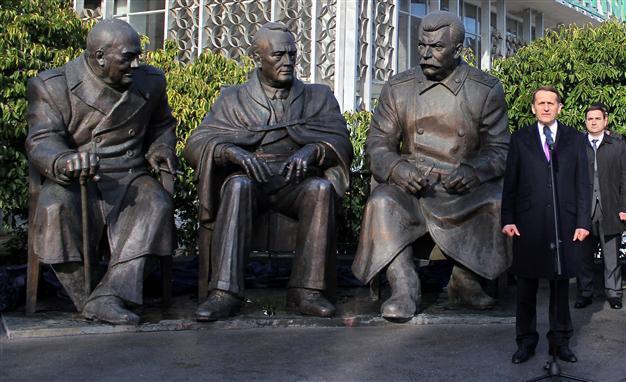Russia erects controversial 'Big Three' monument in Crimea
YALTA - Agence France-Presse

Russia's State Duma speaker Sergei Naryshkin (R) attends the opening ceremony of a monument, featuring British Prime Minister Winston Churchill (L),US President Theodore Roosevelt (C) and Soviet leader Josef Stalin, the three Allied leaders, side-by-side in the Yalta conference in Livadiya outside Yalta, Crimea on February 5, 2015. AFP Photo
Russia on Feb. 5 defied anger by unveiling a controversial monument to Soviet leader Joseph Stalin, Britain's Winston Churchill and US President Franklin Roosevelt at their fateful meeting in Crimea in 1945.The huge monument was inspired by enduring images of the "Big Three" meeting in the resort town of Yalta on the balmy shores of the Crimean peninsula to discuss their anti-Nazi Germany strategy and decide the fate of the post-war world.
The inauguration of the 10-tonne bronze sculpture by Russia's Zurab Tsereteli was timed to coincide with events marking the 70th anniversary of the Yalta conference.
The monument at the Livadia Palace was unveiled to the sounds of the Russian anthem in the presence of the speaker of Russian parliament's lower house, Sergei Naryshkin.
Just like the famous pictures of the landmark meeting, the sculpture depicts the three leaders seated on a bench, a disabled Roosevelt between Churchill and Stalin.
The figures of the two Western leaders are 3.2 metres (10 feet) high, while the statue of the Soviet host -- who according to Western memoirs dominated the talks -- is ten centimetres (four inches) higher.
Tsereteli first hoped to see the monument installed a decade ago but Ukrainian authorities dropped the plan after outraged Crimean Tatars -- for whom Stalin remains a hate figure -- took to the streets across the peninsula.
Under Stalin, Tatars, a Turkish-speaking Muslim population, were accused of collaborating with Nazi Germany and deported to Central Asia. Many of them died of starvation and disease. They began returning to Crimea under Mikhail Gorbachev and became Ukrainian nationals after independence in 1991.
In the run-up to the ceremony, the Tatar Crimean minority's assembly, the Mejlis, spoke out against the installation of the sculpture in Crimea which Russia seized from Ukraine last March.
"If the monument gets erected it would be an open demonstration of the attitude to the memory of Crimea and our people," said a member of the assembly, Abduraman Egiz.
The peninsula's 300,000 Tatars oppose Russian rule over Crimea and boycotted a disputed referendum in which a majority of voters were officially reported to have chosen to split from Ukraine.
Critics accuse the new Russian authorities of unleashing a crackdown on Tatar activists.
















